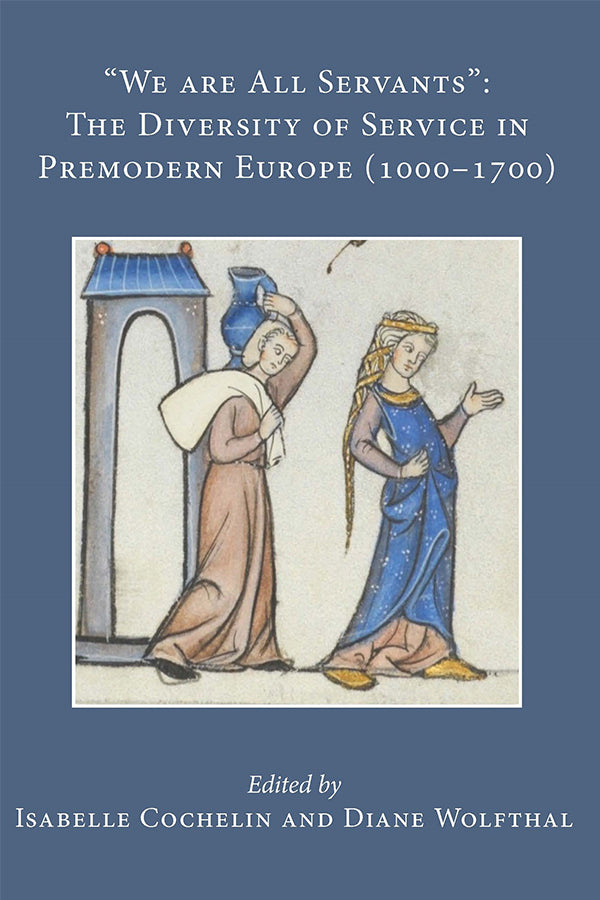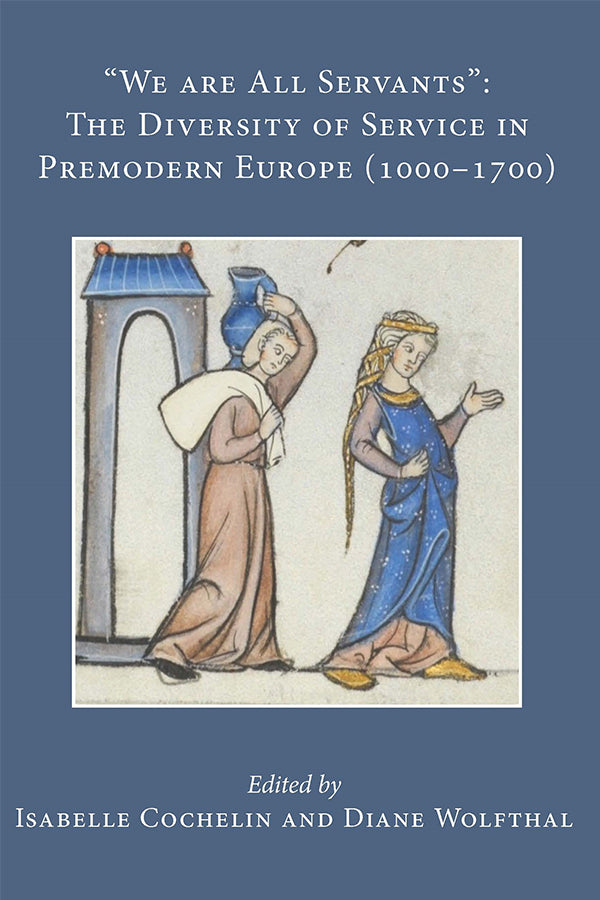"We are All Servants”: The Diversity of Service in Premodern Europe (1000-1700)
Edited by Isabelle Cochelin and Diane Wolfthal - ES54
Overview
Isabelle Cochelin is an associate professor in the Department of History and the Centre for Medieval Studies of the University of Toronto. She recently co-edited with Alison I. Beach the Cambridge History of Medieval Monasticism in the Latin West (2020) and is also one of the main investigators of new research groups on non-cloistered religious women from 1100 to 1800 (including The Other Sister).
Diane Wolfthal is David and Caroline Minter Chair Emerita in the Humanities at Rice University. Her books include The Beginnings of Netherlandish Canvas Painting (1989), Images of Rape (1999), Picturing Yiddish (2004), In and Out of the Marital Bed (2010), and Household Servants and Slaves (2022). She was one of the Founding Editors of Early Modern Women: An Interdisciplinary Journal.
632 pp., 67 ill.
ISBN: 978-0-7727-2228-7
Published: 2022
Contents
Isabelle Cochelin – “Introduction”
Servants in Noble Households
1. Arnaud Montreuil – “Qui pour armes servoient: Service and Knighting in the Vernacular Courtly Literature of Twelfth- and Thirteenth-century France and England”
2. Kim M. Phillips – “Breast into Service: Wet Nurses in Late Medieval England”
3. Jiting Chu – “Accompaniment as Service: The Ladies-in-waiting of Women of the High Nobility in the late Middle Ages in French and Flemish illumination”
4. Rolf Strøm-Olsen – “The Part-Time Courtier: The Periodic Contract System at the Court of Burgundy”
Servants in Religious Settings
5. Laura Moncion – “Between Servant and Disciple: Recluses’ Attendants in Three Medieval Rules for Recluses”
6. Adam J. Davis – “Servants and Service in Twelfth- and Thirteenth-Century French Hospitals”
7. Kate E. Bush – “Maids of the Handmaidens: Serving Sisters in Clarissan Communities, c. 1250–1550”
8. Emma Gabe – “Lay Sisters and the Discourse of Service in the Late Medieval Sister-Books”
9. Isabel Harvey – “From Servants to Converse Nuns: Tridentine Enclosure and Economic Reform in Convents of the Papal States under Clement VIII”
Servants in Diverse Lay Households
10. Lucie Laumonier – “Domestic Service in Late Medieval Languedoc: The Household and the Family”
11. Francine Michaud – “The Meaning of Servanthood in Private Households: The Case of Thirteenth- and Fourteenth-Century Marseille”
12. Jeremy Goldberg – “‘For his good and faithful service’: Being a Servant in Later Medieval England”
13. Elena Brizio – “Friends or Enemies? Sienese Servant Women in the Fifteenth and Sixteenth Centuries”
14. Marlee Couling – “‘She Would Long Since Have Been Starved’: Networks of Support between Mistresses and Female Servants in Seventeenth-Century England”
Discourses on Service
15. Bert Roest – “The Lay Servant in Franciscan Homiletics and Household Management Books”
16. Sarah Pech-Pelletier – “The Evolution of the Notion of “Service” in Thirteenth- to Sixteenth-Century Spain: Servants, Enslaved Persons, and Masters in the Eyes of the Law”
17. Diane Wolfthal – “The Unseen Servant in Late Medieval and Early Modern Art”
18. Mathilde Legeay – “Representations of the Female Servant in the Italian Religious Paintings of the Seicento: Between Reality and Fiction”
19. Elizabeth S. Cohen – “Varieties of Servants in Premodern Europe: Some Thematic Connections”
Praise
Bringing together visual, archival, and normative sources from various parts of Europe, this innovative collection of essays illuminates the degree to which “service” structured the lives of pre-modern people from nearly every echelon of society. It renders visible the lives of those who have long remained invisible and challenges our notions of religious poverty by exposing the degree to which monks, friars, nuns, and recluses depended upon the humble labour of others.
– Sharon Farmer, University of California, Santa Barbara
By their very definition, servants work at the edges of the events that usually attract historical attention. By putting servants at the centre of analysis, this exciting collection of essays reveals how context, gender, and region shaped life as a servant in medieval Europe. The authors deploy innovative methodologies and diverse source materials to ask insightful questions about the circumstances, intimacies, and vulnerabilities that came with working as a servant.
– Katherine French, University of Michigan
The essays in this volume bring together a diverse perspective revealing servants and service in Europe from the Middle Ages to the Early Modern period. Using a variety of methodologies and sources, visual and textual, the innovative interpretations provide vital information for scholars. Many chapters include newly discovered evidence revealing the daily lives of servants, secular and religious, who have hitherto been shrouded in opaque invisibility.
– Elizabeth A. Lisot-Nelson, University of Texas at Tyler
Reviews
The glimpses into the 'variety of servant experiences' (p.375) over time and in varying socio-religious settings are impressive...The thought-provoking leitmotif of the volume, that 'everybody in the unequal medieval [and pre-modern] society is equally subject to service' (p.56), will certainly serve as an inspiring guideline for future research.
– Corinna Peres, University of Vienna, Austria in The English Historical Review, cead157.
Couldn't load pickup availability


